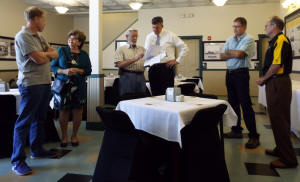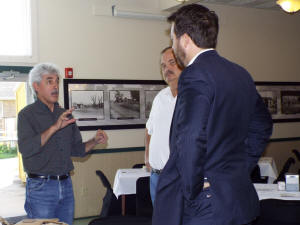|
 LaHood began his day at home in Peoria, then went to Bloomington
for a meeting. He stopped for lunch at the Palms Grill in Atlanta
where he enjoyed time with an intimate group of constituents. He
then moved on to Mount Pulaski to visit with students before moving
on to Springfield where he participated in a pre-election debate
with his Democrat opponent, Junius Rodriguez. LaHood began his day at home in Peoria, then went to Bloomington
for a meeting. He stopped for lunch at the Palms Grill in Atlanta
where he enjoyed time with an intimate group of constituents. He
then moved on to Mount Pulaski to visit with students before moving
on to Springfield where he participated in a pre-election debate
with his Democrat opponent, Junius Rodriguez.
In Atlanta, several of the local community leaders came to have
lunch with LaHood and have casual conversations about concerns they
have for federal, state, and local issues.

Among those on hand were Atlanta Mayor Fred Finchum, Lincoln
Alderman Rick Hoefle, Logan County Board Chairman David Hepler,
county board members David Blankenship and Gene Rohlfs, Lincoln
Mayoral candidate Wanda Lee Rohlfs, Bill Thomas of the Logan County
Economic Development Partnership, Bill Kelly of the Illinois Scenic
Byways, Illinois State Representative Tim Butler.

LaHood started the conversation talking about his career and how he
had served as a prosecutor in Illinois, then Las Vegas, Nevada. He
and his wife had reached a point where they were concerned about
where they were, as opposed to where they wanted to raise their
children and decided that was not in Las Vegas. The couple returned
to Illinois for that reason.
LaHood said he’s been in office just over a year, but throughout
that time spent in Washington D.C., he has come “home” every
weekend, and at the same time, has never missed a vote in the House
of Representatives. He laughingly proclaimed that he is no longer
the very lowest man on the totem pole, as since his arrival another
new congressman has come on the scene, giving LaHood the rank of
434th member instead of 435th.
LaHood said he takes the position that the United States needs to
return to a “pro-growth economy,” doing more to make it possible for
business and industry to exist in this country rather than on
foreign soil. He said that he is a great proponent for agriculture
and respects that his district is the eighth largest agricultural
based district in the United States. His goal is to work toward
promoting agriculture, creating more trade opportunities and less
regulation for ag producers.
He said that with agriculture being a large portion of our nation’s
trade, it is disturbing to realize that fewer and fewer
representatives in Washington D.C. represent agricultural districts.
LaHood went on to speak about the work with his Illinois
Agricultural Advisory Committee and added that on the whole, we need
to figure out what it will take to incentivize young people to stay
on the farm.
Moving on, he said he wanted to complement the community leaders in
Atlanta. He noted that many small communities in rural areas are
dying out, but Atlanta is thriving through good, strong leadership.
While they ate, LaHood invited his guests to address any topics or
questions they had for the representative.

Wanda Lee Rohlfs was the first to speak, inquiring about
transparency in government and communication between federal, state,
and local agencies. LaHood said that frankly, he didn’t think there
was a whole lot of coordination between the governing entities. He
said the key was to elect officials who are communicative, and open
and transparent. He said that he tried to set an example for others
as a communicator with his constituents.
Rohlfs then asked about the theory of “pro-growth,” wondering where
it was to begin, was that a federal-level task that would work its
way down to local communities, or must it start on the lower levels
and work its way up.
LaHood said that he did not believe the Republicans, in general,
have not done enough to get behind pro-growth. He said the last time
the United States had seen pro-growth was during the Bill Clinton
administration. He added that part of what is hindering growth in
America is over-regulation, and he believes the federal government
needs to back off.
He went on to say that another hindrance to pro-growth was Obama
Care. He said the federal health initiative was hurting business in
general, and that there is a serious need to look at the program,
repeal and restructure the health program.
David Hepler asked a compound question regarding terrorism, and the
military and the true size of the problems. LaHood said there were
issues with the “Lone Wolf” terrorism that is the work of ISIS. He
said that the federal administration had not done enough to stop
ISIS from infiltrating into our country. LaHood also noted that the
United States erred in pulling troops out of Iraq. He said when the
U.S. pulled out the Iraqi army fell apart and ISIS stepped in and
took over.
[to top of second column] |

LaHood also noted that changes are needed in the immigration policies that would
further prevent these terrorist groups to send infiltrators into the United
States.
At the same time, he noted that the country has to be fiscally aware of the cost
of the military actions and that it cannot go into debt.
Bill Kelly commented that it appeared that there was a need for compromise in
the Congress. He said that there was an attempt to take on the attitude, “I may
not like you, but we do have to work together.” He wondered if
Congress was working toward being more unified.
LaHood said that he felt that Congress was somewhat of a dysfunctional unit
because of the divisions. He noted that having John Boehner out of the picture
was good, but there needed to be more change. He also mentioned a bill to revamp
congressional rules and set up a better Congress. He noted there is a proposal
for a “Congress of Tomorrow.” He noted that there is a segment on the LaHood
website about the Congress of Tomorrow.

Bill Thomas and Bill Kelly noted the value of Route 66 in Illinois and shared
with LaHood work that is already underway in Illinois for the celebration of the
100th anniversary of the Route 66 Mother Road. Kelly noted that Route 66 brings
people from all over the world through the state.
Thomas shared that since the city of Atlanta began exploiting its Route 66
heritage in 2009, sales tax collections in Atlanta during peak tourist season
has risen 43 percent. Thomas said he wanted to see the federal government
declare Route 66 as a national trail.

With Representative Butler on hand, Thomas also noted that Butler is working on
the state level for a Route 66 program in preparation for the 100th anniversary.
Rick Hoefle noted that the city of Lincoln is also working toward drawing
attention to Route 66 in the city. He noted that the city has been working with
Geoff Ladd and Kelly’s organization to increase signage in the heart of the city
that will bring tourists into town and the downtown businesses.
Kelly also noted that the Scenic Byways recently started selling motorcycle
license plates to support Route 66 projects. The state already offers a vehicle
plate for Route 66, but Scenic Byways must take orders for a minimum of 2,000
motorcycle plates before the state offers them to the public through its
specialty plate program.
The final question of the day came from Hepler who inquired of Representative
Butler about the stop-gap budget and what was going to happen in the state at
the end of the year. Butler said there is work in progress, and he is hopeful
that discussions will continue into the first of the year, with a budget
forthcoming.
As the questions wound down, LaHood noted that he was on a schedule that
included a trip to Mount Pulaski where he would address some students at one of
the schools. He thanked everyone for joining him for lunch.
He closed responding to a question from Wanda Lee Rohlfs about what the people
can do to move the country in the right direction. LaHood said he believed that
everything starts at a local level. He said community leaders could stress the
importance of voting, and electing good leaders, first on a local level, then on
up to the federal level, saying that all good things that happen in this country
start on a local level.
[Nila Smith]
 |